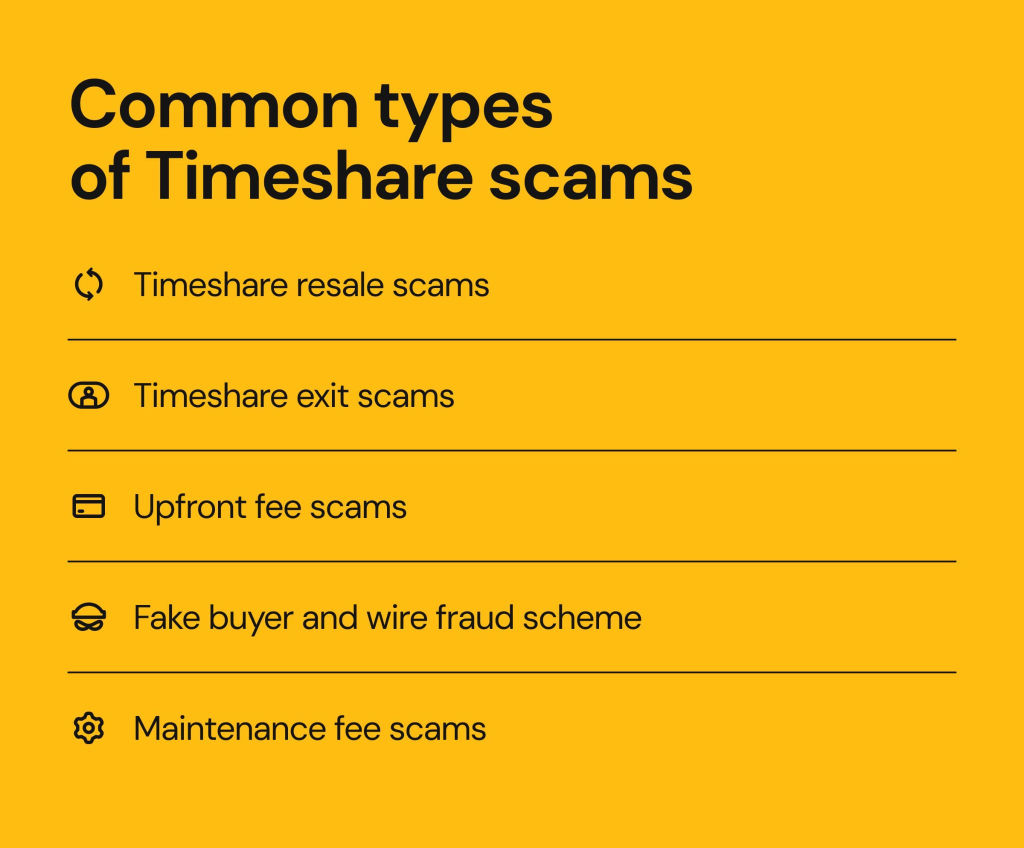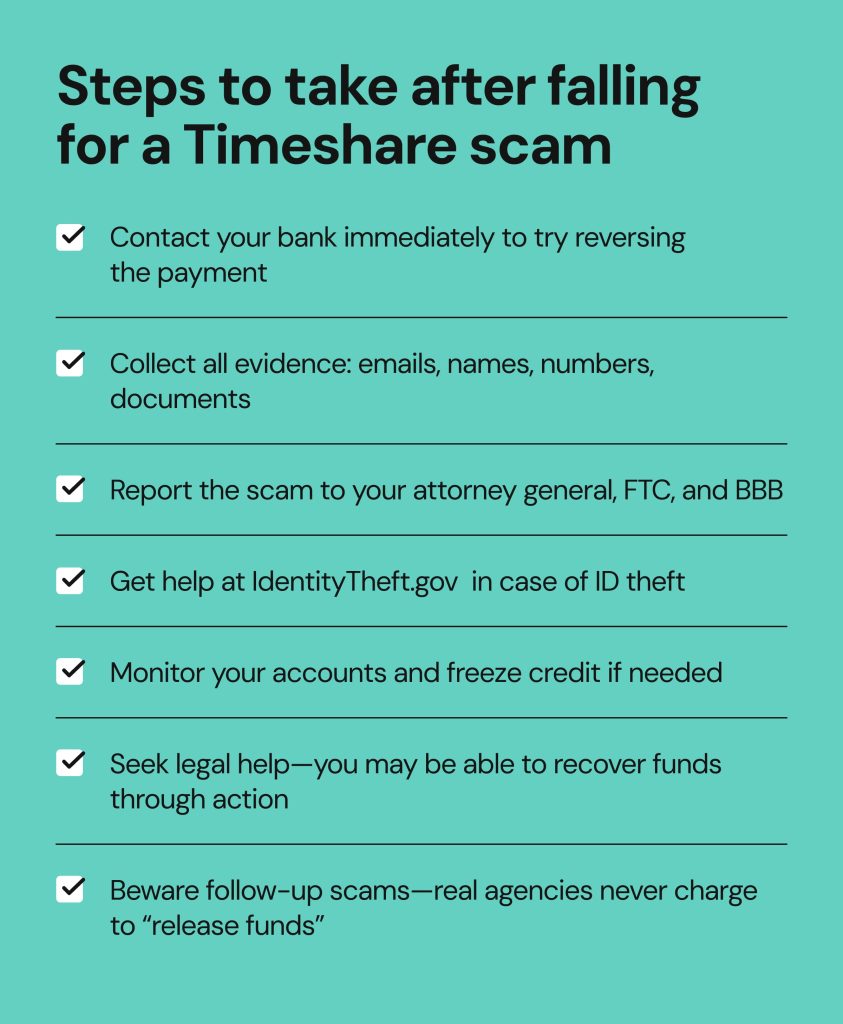Timeshare scams: how they work and how to avoid them

The U.S. vacation ownership (aka timeshares) market is projected to reach a whopping $15.32 billion by 2028, with close to 10 million U.S. households taking part in it. You’d be led to believe it’s a wholesome investment opportunity that pairs profit with convenience of having your own place to come back to on vacation.
But in reality, many timeshare offers are outright scams or get a bad reputation for being nearly impossible to get out of, among other issues like hidden fees and restrictive contracts.
This guide will explain why you should think twice before buying a timeshare, what common timeshare complaints people have, how to avoid getting scammed, and what to do if you’ve already fallen victim.
What are timeshare scams?
Timeshare scams is a catch-all term for scamming schemes that target people who own, want to resell or exit a timeshare. These scams involve bad actors posing as fake timeshare resale and exit companies, as well as unscrupulous real estate businesses.
Many Reddit users report that even with legitimate timeshares, it’s incredibly difficult to get out of a contract—so much that people have started equating timeshares with scams in general. That’s one of the reasons timeshares were rebranded as “vacation clubs” or “vacation ownership” to soften their bad reputation.
Overall, exorbitant maintenance fees that no one talks about during sales pitches, strict membership rules, high interest rates, dramatic real estate price depreciation, and very limited vacation time available (often just one week per year) make timeshares a highly unprofitable choice as a property investment.

How do scammers get timeshare owners’ contact details?
Scammers mine public records and industry data to target owners, then pressure them into paying “fees,” “taxes,” or “closing costs.” Lists of timeshare owners are often made available in professional communities or on data broker websites, so these unsolicited contacts are often the result of a timeshare owner’s personal information exposure.
To minimize the risks of your data exposure to scammers, use a personal data removal service like Onerep to remove your personally identifiable information, including property records and credit score from 220+ websites.
Common types of timeshare scams
Browse the list of timeshare scams below targeting those who own, want to get out of, or resell their timeshare.
Timeshare resale scams
Scammers take advantage of timeshare owners who are willing to resell their timeshare, either by renting out their unused property or bonus points, or by selling permanently to get out of the contract.

These fake timeshare resale companies claim to have buyers interested in the property or pose as buyers themselves using fake contact information and identities. They may also claim that the market is “hot” and the best time to act is now. Then they ask for an upfront fee for the listing, appraisal, marketing, or a “transfer tax” and promptly disappear after getting paid.

Timeshare exit scams
With so many people facing difficulties getting out of their timeshare contacts, scammers see it as another opportunity to defraud timeshare owners.
Fake timeshare exit companies advertise guaranteed contract terminations, often telling you to stop paying your resort (which can lead to foreclosure and credit damage), and charge thousands of dollars in upfront fees. Even if the company looks believable at first glance, it will stop responding after making false claims of contract cancellations. In other cases, scammers deliberately drag out the process with no results and no way to recover the money paid.

Upfront fee scams
Timeshare reselling companies approach timeshare owners with attractive proposals to get them out of their contract—for a fee that must be paid upfront. Scammers disguise these upfront charges as escrow deposits, taxes, title searches, or legal and marketing expenses.
The upfront payment typically comes before any resale terms and conditions are discussed. By the time the owner knows what they’re getting into (often facing additional fees or a damaged credit score), the initial payment can’t be reversed.
Upfront fee scams also involve fraudsters promoting fake timeshare bonus points and upgrades, which can supposedly be claimed by paying an advance fee. Needless to say, once the payment is through, customers receive nothing in return.
Fake buyer and wire fraud scheme
In a variation of the timeshare resale scam, scammers pose as brokers and approach timeshare owners unsolicited, claiming they have a buyer actively interested in purchasing their timeshare for a large sum of money. To close the deal, the timeshare owner just needs to wire an upfront payment to cover taxes or other related expenses. In some cases, these fees are said to be refundable once the purchase is complete.

In reality, scammers scan public records and timeshare marketplaces to identify people looking to sell their timeshares, then target them with fabricated stories of interested buyers who don’t even exist. Once the wire transfer is received, the scammers disappear, leaving the victim with practically no way to recover the funds.
Maintenance fee scams
Maintenance fees are a notoriously expensive part of owning a timeshare and a key reason why many owners want to get out of their contracts. Knowing this, scammers come up with fraudulent schemes such as:
- Sending out fake fee collection notices via email, texts, or mailed letters, claiming your maintenance fees are outstanding and threatening legal action.
- Posing as resort affiliates and offering to reduce your fees by consolidating them or negotiating with the timeshare company for an upfront payment.
- Claiming you can get a refund on overpaid maintenance fees but need to cover “processing charges” or “taxes.”
In all of those cases, the claims are fake, and many may also come with phishing links that lead to malicious websites designed to steal personal and credit card data.

How to avoid timeshare scams
Avoiding timeshare scams comes down to recognizing common red flags and exercising due diligence when researching a timeshare company.
How to recognize a timeshare scam
Here are the red flags to watch out for:
- Unsolicited offers of help or advice to get out of a timeshare or rent it out.
- Claims of being a member of ARDA (the U.S. trade association and governing body for the vacation ownership industry).
- Use of urgency and exclusive “one-day only” deals to pressure you into acting.
- Statements that they already have a buyer for your timeshare or a unique exit strategy.
- Requests for upfront fees for listing, marketing, brokerage, or taxes.
- Any guarantee of a sale, price, or contract cancellation.
- Instructions to stop paying your resort or timeshare company.
- Requests for payment via cryptocurrency or wire transfer to foreign accounts or “escrows.”
How to vet a timeshare company
You should research the timeshare company before attending the sales presentation, question all the information shared during the pitch, and ask about options for terminating the contract if signed. The same applies when dealing with a timeshare resale or exit company.
- Check the state real estate regulator to verify if the company is licensed to sell real estate in your timeshare’s location.
- Contact your local consumer protection office to check for complaints related to the company (you can find one in the U.S. here).
- Look up the company on the Better Business Bureau (BBB).
In addition, there’s a set of safe practices to follow when contacted by a “representative” of a resort, timeshare operator, or a resale/exit business:
- Be cautious of any company approaching you with an offer to resell your timeshare or get you out of it for a fee.
- Never pay any upfront fees when selling your timeshare.
- Never wire money to an account provided in an unsolicited contact.
- Don’t believe guarantees blindly. Legitimate brokers can’t guarantee an outcome.
- Use official channels to find a trusted timeshare exit company. ARDA provides this valuable resource listing timeshare developers in the Coalition for Responsible Exit.
- If working with a reseller, ask how they plan to advertise your timeshare and whether they have past client reviews you can verify.
If you wonder how to sell a timeshare without getting scammed, know that you can:
- Give it away for free, exchange it, or sell it on trusted timeshare resale platforms such as Timeshare Users Group.
- Enter a deedback program with your timeshare company that will work with you to get it back (if available).
- Hire a lawyer for legal assistance in getting out of the contract.
What to do if you’ve fallen victim to a timeshare scam
- As soon as you realize you’ve been scammed, contact your bank immediately to try reverting the transaction. Wire transfers can typically be recalled or held within the first few hours. However, if you paid via anything other than a credit card, you might not be eligible for consumer protection under the Consumer Credit Act 1974.
- Collect all available evidence, such as emails, phone numbers, company names, and documents.
- If you’re in the U.S., file a complaint with your local state attorney general, the Federal Trade Commission, and the Better Business Bureau.
- If you suspect identity theft, such as scammers having stolen your personal information, get a recovery plan via IdentityTheft.gov.
- Monitor your financial accounts, enable fraud alerts with your financial services providers, and consider freezing your credit if you suspect scammers may attempt to take out loans in your name.
- Contact your local state attorney and seek legal help in recovering your funds. As mentioned in the cases below, it’s possible to pursue legal action and obtain a refund if successful.
- Finally, beware of repeated scams. Once scammers know you’ve fallen for their exploits, they may approach you a second time, impersonating scam recovery services or government agencies offering fraud remediation and legal assistance. Know that legitimate bodies never ask for payment to “release funds” or initiate legal action.

Real-life cases of timeshare scams
The FBI warns that the most reported fraud operations in the U.S. are run by Mexican cartels targeting elderly U.S. citizens. Fraudsters approach victims offering to exit their timeshare, rent it out, or buy share certificates, and drain the victims’ pockets through “advance fees” or “taxes.” In total, between 2019 and 2024, 6,000+ victims reported losses of more than $300 million due to timeshare fraud.
In 2023, the owners of a timeshare resale scam business were sentenced to federal prison for defrauding more than 8,000 victims of $18 million in total.
Early in 2025, a Minnesota attorney reached a settlement with three “timeshare exit” companies who violated the law by charging thousands of dollars in upfront fees without being properly licensed. As a result of this successful settlement, consumers were to be refunded with $269,378 in total.
In another case, a legal was brought against a Florida-based company that fraudulently promised to sell timeshare properties and charged between $500 and $2,500 in upfront fees.
The cases above prove that timeshare fraud should be reported. Government and law enforcement agencies are working to track down and bring legal charges against perpetrators, with victims being refunded in successful settlements.
The bottom line: a playbook to keep safe from timeshare scams
Remember that many scams start the same—an unsolicited contact, an offer that’s too good to be true, using urgency and scare tactics, and giving you no time to verify the information independently. You can see the same patterns in many impersonating exploits, such as Xfinity scams or Geek Squad scams.
If you didn’t initiate the contact, distrust it. Scammers can find your personal details on Google, in public records, on data broker websites, and even the dark web as a result of a data breach. So if you do want to resell or exit your timeshare, start by talking to your developer or timeshare operating company and see if they offer vetted options instead of relying on intermediaries.
FAQs
Are timeshares scams?
Not inherently. Timeshare itself is a legitimate form of property ownership and vacation membership. The scams arise from reselling, exiting, fake brokerage, and fee-collecting services that prey on frustrated or financially burdened owners.
How to sell a timeshare without getting scammed?
Work only with your property developer or a licensed real estate broker authorized to sell property in your timeshare’s location. Avoid paying any upfront fees and verify the company through your local real estate regulator. Check with your resort—it may offer a buyback or deedback program.
What are the most common timeshare scams?
Top variations include resale scams with fake buyers, exit company scams promising guaranteed cancellations, upfront fee scams, and fake maintenance fee collection scams. They typically start with an unsolicited contact and require some form of an upfront payment to move the deal forward.
Can I get my money back if I fell victim to a timeshare scam?
Possibly yes, but it depends on each particular case. If you wired money to a scammer, contact your bank immediately to try recalling the transfer. You can also request credit card chargeback on a fraudulent transaction, as well as work with an attorney and your local law enforcement agency to bring legal charges against the scammers. This may result in a refund if the case is settled successfully.





Mikalai is a Chief Technical Officer at Onerep. With a degree in Computer Science, he headed the developer team that automated the previously manual process of removing personal information from data brokers, making Onerep the industry’s first fully automated tool to bulk-remove unauthorized profiles from the internet.